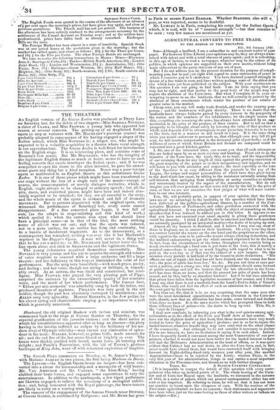THE THEATRES.
AN English version of La Gazza Ladra was produced at Drury Lane on Saturday last, for the debfit of two singers—Miss SABILLA NOVELL°, a sister of CLARA, and Miss FLOWER, a young lady who appeared last season at several concerts. The getting-up of an Anglicised Italian opera (a step at variance with Mr. MACREADY'S previous course) was probably adopted in consequence of his having engaged a singer of the Italian school, which Miss NOVELL() is; a singer, too, who might be expected to be a valuable acquisition in a theatre where vocal strength is not superabundant. The Gazza Ladra is well fitted for introduction on the English stage. It is an interesting piece, and contains some of ROSSINI'S best music. But Mr. MACREADY, who has the integrity of the legitimate English drama so much at heart, seems to have no such feeling towards that exotic interloper the Italian opera ; and, if he was compelled to open his doors to the alien intruder, lie gave his unwel- come guest any thing but a kind reception. Never was a poor foreign opera so maltreated in an English theatre as this unfortunate Gazza Ladra. It is one of those pieces which might have been transferred to our stage without the loss of a single note of the music—except, of course, the unaccompanied or merely dialogue recitative, which, in English, ought always to be changed to ordinary speech : but all the airs, duets, and concerted pieces, might have been and indeed abso- lutely required to be retained ; for they are all essential to the story, and the whole music of the opera is animated and full of dramatic movement. But to persons acquainted with the original opera, who witnessed the performance of Saturdayi last, every scene caused disappointment. If a fine concerted piece began, it was full of cuts, (as the adepts in stage-tailoring call this kind of work,) which spoiled it ; when the curtain rose upon what should have been a principal scene—as in that of the trial, the most striking scene of all—it was cut out; and thus the opera was reduced, not to a mere outline, for an outline has form and continuity, but to a bundle of incoherent fragments. As to the denouement, as a contemporary has remarked, nothing was ever like it but Macheath's reprieve in the Beggar's Opera. A man will never do a thing well that he has not a mind to ; so Mr. MACREADY had better leave the Ita- lian opera alone, and stick to SEARSPERE and the legitimate drama. The young debutantes acquitted themselves successfully. Miss Ilovisixo is very young, and has yet to acquire the strength and volume of voice requisite to contend with a large orchestra and fill a large theatre ; and her deficiency in this respect diminished the éclat of her performance. But she sang very beautifully—with much grace, purity, and feeling ; and her voice, though not strong or brilliant, is remark- ably sweet. As an actress, she was timid and constrained, but intel- ligent. Miss FLOWER, who played the very pleasing part of Pippo, surprised the audience by the extraordinary quality of her contralto voice, and the merit of her whole performance. The famous duet, " Ebben per mia memoria" was admirably sung by both the ladies, and produced thunders of applause. PHILLIPS was very good in the old soldier, though the part was absolutely destroyed by mutilations ; and ALLEN sang very agreeably. MORRIS BARNETT, in the Jew pedlar, by his clever acting and characteristic singing guve importance to a part which is generally unnoticed.


























 Previous page
Previous page